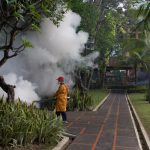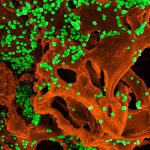IMU Healthcare Family Medicine Specialist, Associate Professor Dr Verna Lee Kar Mun clarifies the similarities and differences in symptoms in relation to the two diseases and highlight the importance of seeking timely medical attention.
Recent reports of overlapping symptoms and misperception by the public on dengue and Covid-19 have caused some confusion and alarm as we become ever-vigilant and hypersensitive to the slightest signs of illness in the current global health crisis. “Dengue and Covid-19 are very different diseases in that Covid-19 is essentially a disease of the respiratory system whilst dengue is a vector-borne, systemic febrile disease that may or may not have respiratory symptoms,” explains IMU Healthcare Family Medicine Specialist, Associate Professor Dr Verna Lee Kar Mun.
“Covid-19 is caused by the latest addition or 7th member of the coronavirus family that infect humans, which we now know as SARS-CoV-2. The virus is transmitted through respiratory droplets via coughs and sneezes, and through hand shaking and direct contact with contaminated objects and surfaces such as counter-tops and doorknobs.
“Dengue, on the other hand, is an acute febrile illness, caused by infection with one of the four (4) related single-stranded RNA Flavivirus, namely DENV-1, DENV-2, DENV-3, or DENV-4. It is transmitted through the bite of infected female Aedes mosquitoes, namely Aedes aegypti and Aedes albopictus, which breed in stagnant clean water collected in flowerpots and blocked drains after a downpour. Aedes mosquitoes hunt for prey just before sunset and in the first 2 hours after sunrise,” she adds. The two diseases share some similarities in that individuals infected with either virus would likely present symptoms of fever with chills along with the following:
| Covid-19 | Dengue | |
|---|---|---|
| Temperature | Mild to moderate 37.5 to 39oC that may continue for several days | High fever of up to 40 to 41oC from day 1 to 5/6 with a break and relapse by day 7/8 (biphasic fever pattern) |
| Fatigue | Yes | Yes |
| Muscle & Joint Pain | Affects 15% of Covid-19 patients | Very Common – hence the common term “break bone fever” |
“What differentiates the two diseases is that in cases of dengue, in addition to fever, tiredness and bone pain, headache with pain around or behind the eyeballs is very common and the patient may have rashes on the lower limbs and chest (small islands of white in a sea of red); nausea, vomiting and some abdominal pain,” explains Dr Verna. “Respiratory-related symptoms like dry cough, nasal congestion, difficulty in breathing, conjunctivitis and a loss of taste and smell, on the other hand are more synonymous with Covid-19.” The risk of contracting dengue is ever-present even as the nation battles the global Covid-19 pandemic.
| Statistics from the National Crisis Preparedness and Response Centre (CPRC), Ministry of Health Malaysia (MOH) | |
|---|---|
| The country’s total cumulative cases for dengue for the period between 29 December 2019 and 30 June 2020 | 55,115 |
| Selangor has the highest number of cases | 30,420 |
| Kuala Lumpur has the second highest number of cases | 5,797 |
| Johor has the third highest number of cases | 5,255 |
In 2019, the cumulative total number of dengue cases were 130,101, a huge leap of 61.4% increase from 80,615 cases in 2018. From January to June this year, 92 people have died because of severe dengue. Dr Verna claims she is seeing more patients with dengue fever coming in earlier to her clinic than before. “With the current Recovery Movement Control Order (RMCO) and rapid spread of health-related news and updates on social media, Malaysians are well-informed enough to be extremely worried when they have a fever.
” Dengue has been endemic in Malaysia since the 1960s. As Aedes mosquitoes thrive in hot and humid weather conditions with plentiful rainfall, the threat of dengue fever in this country is a perennial public health issue. “It is not just the upward tick in cases but the risk of fatality as a result of complications from severe dengue that is most concerning,” says Dr Verna. She remarked, “Most of us may be infected with at least one type of dengue virus in our lifetime. Like Covid-19, it is highly possible to be infected and not know it, as 80% of first dengue virus infections occur with mild symptoms or no symptom at all.”
“However, this is not to say that patients will not develop severe dengue in their first infection. It all depends on the patient’s immune system. People who are more advanced in age and the very young may be more at risk for severe forms of dengue. “Typically, we see more complications in patients who experience a second round of infection. Studies show that patients who are infected with DENV-2 a second time exhibit more worrisome symptoms like persistent vomiting, epigastric pain, low platelet count and plasma leakage. However, it is unlikely that a hospital or clinic will test for specific type of DENV though you may request for that information.”
Dr Verna says there is currently no approved vaccine or effective protection against the dengue virus in Malaysia. She advises individuals who show symptoms of being ill with fever and body ache to seek professional medical advice and get tested early. “Regardless of whether it is dengue or Covid-19, a severe form of disease and complications from late presentation can be fatal.”
“In these uncertain times, many may eschew going to a hospital or medical facility for fear of contracting Covid-19. Tele-consultation with a healthcare professional may be helpful for those who deem themselves high risk for Covid-19 but with a fever of 38.5 to 39 oC, a doctor would not be able to tell if the patient has dengue or Covid-19. As such, it would be better to head over to a private clinic or your local Klinik Kesihatan for consultation from day 1 of fever onset,” she says. Dr Verna explains that all patients who present with the typical symptoms of dengue (i.e. without respiratory symptoms) would be offered the point-of-care rapid dengue antigen diagnostic test (Dengue NS1 antigen test).
“At present, patients with fever and respiratory symptoms such as cough, difficulty in breathing, sore throat, loss of smell… etc. would most likely be referred to labs or government clinics that offer Covid-19 tests. If the Covid-19 test is negative, then a dengue test may be performed,” she says. “When you arrive at the clinic, inform the triage staff at the entrance about your fever and the duration of it. You will then be ushered to an isolation room and the doctor will most likely come in donning full PPE gear to take a thorough history. Be truthful. The doctor will need sufficient information to differentiate dengue and Covid-19 infection.” “All private and government clinics in Malaysia have the rapid dengue antigen diagnostic test. The test has a quick result turnaround of less than an hour and is highly sensitive and specific for dengue if performed from day 1 to day 3 of fever onset.
Once confirmed, doctors will give appropriate advice on follow up and education about the warning signs of severe dengue. These include persistent nausea and vomiting, upper abdominal pain (indicative of involvement of the liver), diarrhoea and spontaneous bleeding from the nose and gums on brushing or on the skin which may appear as minute red spots, usually from day 5 or 6 of fever onset. Be sensitive to your body. Patients who have had one prior episode of known (or unknown) dengue infection should especially take note of worsening symptoms,” she says, adding that it may take a patient 10 to 14 days to recover fully from dengue fever.
| In the News | Newspaper Version | Online Version |
|---|---|---|
| Malay Mail, 16 July | – | Is it Covid-19 or Dengue? Malaysian Doctor Clarifies Differences, Similarities Between Both |
| Yahoo News, 16 July | – | Is it Covid-19 or Dengue? Malaysian Doctor Clarifies Differences, Similarities Between Both |
| Mashable, 16 July | – | Here’s how you can tell the difference between coronavirus and dengue |
| China Press, 4 July | Differences in COVID-19 and dengue fever | Covid-19 & Dengue both causes fever. Seek medical help is recommended |
| Sin Chew, 17 July | Dengue has more symptoms than Covid-19 | Degnue shows more symptoms than Covid-19 |
| Sin Chew, 17 July | Coughing and breathing difficulty are not symptoms of dengue | Dengue & Covid-19 shares the same symptoms?Dengue has no respiratory symptoms |
| NST, 21 July | When fever strikes | When fever strikes |
| Nanyang Siang Pau, 9 August | Similarities and difference between dengue and COVID-19 |









